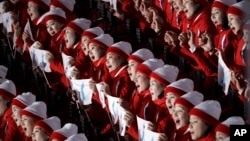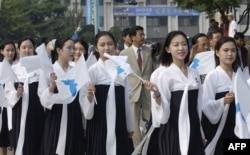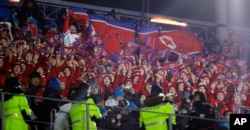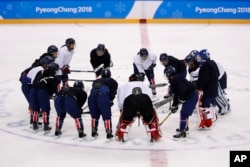The cheering faces of North Korea’s Olympic charm offensive are carefully groomed and under constant surveillance to ensure they present an engaging image to the world, and to prevent any of them from trying to defect.
The over 200 member all female cheerleading squad, dressed often in matching red snowsuits, is the largest contingent of the North Korean delegation participating in the PyeongChang Winter Olympics in South Korea. They have been prominently featured singing and cheering for the unified Korean female hockey team.
On Wednesday, the North Korean cheering squad and South Korean fans joined together in a unification chant, with the cheerleaders calling out “We are,” and the fans replying, “One,” while waiting for the Alpine skiing competition, that was eventually postponed due to high winds.
Often called North Korea’s “army of beauties,” their participation in the Olympics is seen by many as a hopeful symbol of inter-Korean reconciliation. But others see them as merely a pretty mask to improve the image of the repressive North Korean state that threatens the world with its continued development of nuclear weapons and long range ballistic missiles.
Perhaps the most famous former cheering squad member is Ri Sol Ju, the wife of North Korean leader Kim Jong Un. At the age of 16, she participated in the 2005 Asian Athletic Championships in South Korea.
Whatever their intent, the North Korean cheering squad is meticulously orchestrated and tightly controlled. They stay secluded at a somewhat remote resort about 50 kilometers north of Pyeongchang, travel in buses with South Korean police escorts, and are always accompanied by North Korean security officials, even on trips to the bathroom.
South Korea will pay $2.64 million to cover the costs of hosting the entire North Korean delegation that number over 400 members, and includes the cheering squad, athletes, orchestra, taekwondo performers, journalists and support personnel.
“Through the support of the North Korean delegation’s participation in the PyeongChang Olympic Games, the government is making every effort to ensure the successful hosting of the Peace Olympics and the opportunity for reconciliation and cooperation between the two Koreas,” said Unification Ministry spokesman Baik Tae-hyun on Wednesday.
Defection risk
The tight security surrounding the cheering squad reflects the lengths the North Korean government will go to prevent anyone from seeking asylum in South Korea. The selection of cheerleaders from more well to do families, that attend elite universities, and have no relatives living abroad, also lowers the risk of possible defections.
Han Seo-hee, a North Korean defector to the South, who was at one time a North Korean cheerleader, said the young attractive and tall women chosen for the cheering squad undergo intensive ideological training to ensure their loyalty to the state and in particular to leader Kim Jong Un.
They are told not to engage on a personal level with South Koreans they come in contact with, and are also instructed to report any inappropriate comments or behavior from fellow squad members.
“They are educated to keep watch on each other. They go through self-criticism as well as criticizing those that they were monitoring,” said Han.
Han’s squad was under the Ministry of People’s Security, a national law enforcement agency and she says they were told that attempting to escape would put the lives of their families at risk.
“They said if you betray your country, you are betraying your family. In other words, even though it was not said, it can be inferred that if you defect, your family will not be safe,” said Han.
Hockey interaction
The 12 North Korean hockey players are also separated from their South Korean teammates in a different building inside the Olympic athletes' village. The unified team does eat together although the northerners are watched over by government minders.
Players for the South, however, say the team is bonding despite some initial hard feelings about the last-minute decision to create a unified team. Team coach Sarah Murray said in the locker room this week that they were singing together, and players from the South were teaching teammates from the North “how to K-pop dance."
The advocacy group Human Rights Watch (HRW) has called North Korea’s Olympic outreach “a significant effort at engagement and cooperation,” but added that in the long run it should be judged on whether it leads to “concrete improvements in the lives of the long-suffering North Korean people.”
North Korea is “one of the most repressive authoritarian states in the world,” according to a 2018 HRW report that points out tight travel restrictions and punishments for contacting the outside world, among the list of human rights abuses.
A 2014 United Nations report also documents ongoing atrocities in North Korea that include a network of political prison camps and systematic human rights abuses, including murder, enslavement, torture and rape.







